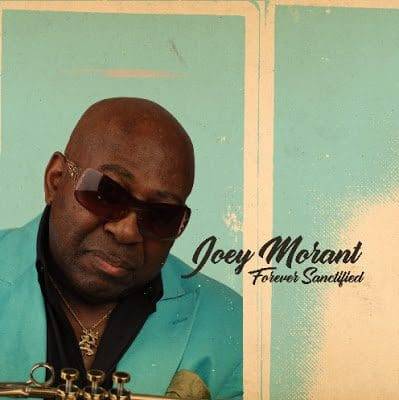Joey Morant Forever Sanctified
Joey Morant
Forever Sanctified
BluJazz
Trumpeter, composer, producer, entertainer Joey Morant is a veteran presence in the current NYC jazz scene. Morant works as a soloist, in duet and trio settings, and in larger bands and orchestras. It’s not only his trumpet playing, but scat singing, and his on stage banter that sets him apart. His mentor is Louis Armstrong and Morant is known as much for his interpretations of Louis as anything else. For this album though, he offers six originals and six covers in a generous twelve tunes, played in trio, quartet, and sextet configurations, with his son Amadeus, the only constant for every track, on drums.
Morant hails from Charleston and specifically from the Jenkins Orphanage band tradition of the 1950s. At age 11, inspired by the piano, he took an interest in classical music. He later studied the trumpet and by age 15 was teaching basic theory and jazz at the Daniel Jenkins Orphanage in North Charleston, SC and basic jazz to his young friend, Oscar Rivers. He has performed internationally and played with artists from Ray Charles and James Brown to Dizzy Gillespie and King Curtis. Yet, he doesn’t have many albums as a leader. As a result, he covers a lot of territory here.
The first three tracks are original. “Wacky, Lucky, Clacky,” a soul jazz tune with Mike LeDunne on organ, Mark Whitfield on guitar and Amadeus on drums. That unit also plays on “It’s Expensive to Be Poor” which introduces his own spoken words as well as both straightforward and scat vocals with the same backing quartet. “All rise for the ‘Star Spangled Blues’” introduces another soul jazz tune with organist LeDunne and guitarist Whitfield prominently supporting Morant’s trumpet.
As he introduces his faithful cover of Lee Morgan’s “Sidewinder” he mentions that his son is 17 years old and played drums on this tune when he was just eight years old. The players here, excepting Amadeus, change, becoming a sextet with John Simon on tenor sax, Max Schweiger on baritone sax, Ted Firth on piano and Cameron Brown on bass. Morant takes his solos on both trumpet and flugelhorn. “Charleston She-Crab Soup,” is, as you might guess, another Morant original handled with the original quartet in a soul-jazz mode.
The lovely ballad “Annie Laurie,” the album’s longest track at over eight minutes, has a different quartet with Firth on piano and Brown on bass as again Morant plays both horns. Each player takes his turn, with Brown’s bowed and plucked upright especially outstanding. This, as much as any tune on the album, reveals Morant’s masterful tone and lyrical strength. Yet, he continues this expressive playing on his flugelhorn, for “Don’t Blame Me,” accompanied only by pianist Terrence Conley.
We then hear two more originals with Morant’s melodic post-bop trumpet leading the sextet for “437 Race Street” and “Joey’s Theme.” The standard “Long Ago and Far Away” features Morant’s vocals in a trio setting with Gene Ludwig on the Hammond B3 and Amadeus on drums. He and the same trio follow with the epic ballad, “My Mother’s Eyes,” dedicated to his own mom and everyone else’s too. His tone here in the low register is stunning. Not many trumpeters even come close. Morant concludes with the up-tempo “Hey There,” again accompanied by the Firth/Brown quartet as he sings and plays his horns.
It no wonder that Morant has earned the nickname “Mr. Entertainer.” He displays his wide range of talents here. Even if he never makes another album as a leader, there’s plenty to absorb in this one.
- Jim Hynes
[amazon_link asins=’B07G3CMQJG,B07G3F4LYJ,B07G3G8499,B07G3G6QJ9,B07G3G4XVV,B07G3G33N4′ template=’ProductCarousel’ store=’maasc-20′ marketplace=’US’ link_id=’3a5b47b5-a264-11e8-9758-053a3da7e6b6′]
Discover more from Making A Scene!
Subscribe to get the latest posts sent to your email.









